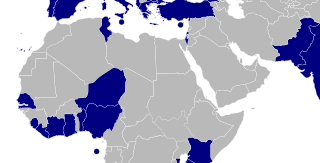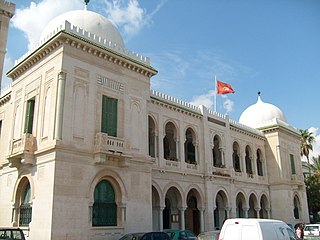Related Research Articles

Democratization, or democratisation, is the transition to a more democratic political regime, including substantive political changes moving in a democratic direction. It may be the transition from an authoritarian regime to a full democracy, a transition from an authoritarian political system to a semi-democracy or transition from a semi-authoritarian political system to a democratic political system.
Mapai was a democratic socialist political party in Israel, and was the dominant force in Israeli politics until its merger into the modern-day Israeli Labor Party in 1968. During Mapai's time in office, a wide range of progressive reforms were carried out, as characterised by the establishment of a welfare state, providing minimum income, security, and free access to housing subsidies and health and social services.

According to The Economist Group's Democracy Index 2020 study, Israel is the only democratic country in the Middle East, while Tunisia is the only democracy in North Africa. The level of democracy in nations throughout the world published by Freedom House, a U.S.-based, U.S. government-funded advocacy organization, and in various other freedom indices, report the Middle Eastern and North African countries with the highest scores are Israel, Tunisia, Turkey, Lebanon, Morocco, Jordan and Kuwait. Countries that have been consistently labelled as 'not free' by Freedom House (2017-2021) have been Iran, Iraq and Egypt. They have been increasingly becoming more and more adverse to the idea of liberal democracy with their scores steadily decreasing, only Iraq out of these countries have maintained some level of internet freedom with a score of 41/100. The remaining countries of the Middle East are categorised as authoritarian regimes, with the lowest scores held by Saudi Arabia and Yemen.
Tatu Vanhanen was a Finnish political scientist, sociologist, and writer. He was a professor of political science at the University of Tampere in Tampere, Finland. Vanhanen was a coauthor with Richard Lynn of IQ and the Wealth of Nations (2002) and IQ and Global Inequality (2006), and author of Ethnic Conflicts Explained by Ethnic Nepotism (1999) and many other works.

The Arab states of the Persian Gulf refers to a group of Arab states which border the Persian Gulf. There are seven member states of the Arab League in the region: Bahrain, Kuwait, Iraq, Oman, Qatar, Saudi Arabia and the United Arab Emirates.
James L. Gelvin is an American scholar of Middle Eastern history. He has been a faculty member in the department of history at the University of California, Los Angeles (UCLA) since 1995 and has written extensively on the history of the modern Middle East, with particular emphasis on nationalism and the social and cultural history of the modern Middle East.

Sadiki College, also known as Collège Sadiki, is a lycée in Tunis, Tunisia. It was established in 1875. Associations formed by its alumni played a major role in the early constitutionalist movement in the country.
Postcolonialism is the critical academic study of the cultural, political and economic legacy of colonialism and imperialism, focusing on the impact of human control and exploitation of colonized people and their lands. More specifically, it is a critical theory analysis of the history, culture, literature, and discourse of imperial power.
John S. Dryzek is a Centenary Professor at the Centre for Deliberative Democracy and Global Governance at the University of Canberra's Institute for Governance and Policy Analysis.

The Arab street is an expression referring to the spectrum of public opinion in the Arab world, often as opposed or contrasted to the opinions of Arab governments. In some contexts it refers more specifically to the lower socioeconomic strata of Arab society. It is used primarily in the United States and Arab countries.
Student protests in Croatia 2009 began at the Faculty of Humanities and Social Sciences at the University of Zagreb. On Monday, 20 April 2009, the independent students' initiative for the right to free education started an occupation of the Faculty of Philosophy in Zagreb, Croatia. The occupation lasted for 35 days, until 24 May, when the students voted to suspend the occupation. The students were protesting the Croatian government's plans to reduce public funding for higher education.

American democracy promotion aims to encourage governmental and non-governmental actors to pursue political reforms that will lead ultimately to democratic governance.

Amr Hamzawy is an Egyptian political scientist, human rights activist and public intellectual.
Amaney A. Jamal is an American scholar of Middle Eastern politics who is currently the Edwards S. Sanford Professor of Politics and Director of the Mamdouha S. Bobst Center for Peace and Justice at Princeton University. Jamal earned her bachelor's degree in politics at UCLA in 1993, followed by her PhD in political science from the University of Michigan. A Carnegie Scholar, Jamal specializes in democratization and civic engagement in the Arab world as well as Muslim and Arab civic engagement in the US. She currently directs the Workshop on Arab Political Development at Princeton University, is the principal investigator of the "Arab Barometer Project", which was awarded the Best Data set in the field of Comparative Politics in 2010, and is senior advisor on the PEW Research Center Projects focusing on Islam in America and Global Islam. Jamal has been interviewed on numerous programs throughout her career including MSNBC, Al Jazeera, and the Washington Post to discuss issues ranging from the Palestinian–Israeli conflict to politics of the Arab world at large.

Shawki Ibrahim Abdel-Karim Allam is the 19th and current Grand Mufti of Egypt through Dar al-Ifta al-Misriyyah, succeeding Ali Gomaa.
Le Renouveau was a French language newspaper published in Tunis, Tunisia. It existed from 1988 to 2011 and was the official organ of the ruling party of Tunisia, Constitutional Democratic Rally (RCD).
Arwa Othman is a Yemeni writer, journalist, human rights activist and former Minister of Culture (2014–15) in the cabinet of President Abdrabbuh Mansur Hadi. Human Rights Watch has cited Othman as one of the "most outspoken activists calling for human rights and gender equality" during the 2011 Yemeni Revolution.
Josep Maria Colomer Calsina is a political scientist and economist. His research focuses on the strategies for the design, establishment, and change of political institutions. Topics include the processes of democratization, the origins of parliamentary and separation of powers regimes, the invention of electoral systems and voting rules, the development of nations and empires such as the United States and the European Union, and the increasing role of global institutions.

Mohamed Larbi Zarrouk, , was a Tunisian politician.
Marilyn ('Lyn') Ossome is an academic, specialising in feminist political theory and feminist political economics. She is currently Senior Research Associate of at the University of Johannesburg and a member of the advisory board for the Strategic Initiative for Women in the Horn of Africa, amongst other accolades. She is an editorial board member of Agrarian South: Journal of Political Economy, and in 2021, she co-edited the volume Labour Questions in the Global South. She serves on the executive committee for the Council for the Development of Social Science Research in Africa (CODESRIA). She is the author of Gender, Ethnicity and Violence in Kenya’s Transitions to Democracy: States of Violence.
References
- ↑ Larbi Sadiki Archived 27 December 2011 at the Wayback Machine . Carnegie Endowment for International Peace.
